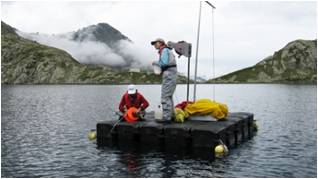Long term ecological research

We monitor a number of biogeochemical and biodiversity variables in atmospheric deposition, lakes, and streams in several experimental catchments of the Central Pyrenees. Our aim is to reveal environmental changes that, because of the remoteness of our study sites, are a reflection of global change. Multi-decadal data series allow us to detect early indications of change and to establish the causal links. This long-term ecological research (LTER) is necessary because large-scale environmental changes occur at a slow pace, may be subtle and difficult to sense, and sometimes a time lag exists between the causing action and the response. Typically, it may take several decades realizing the environmental change, partially understanding its consequences and taking effective actions for mitigation. This has been the case for acid deposition, long-range persistent organic pollution, CO2-induced climate warming, and forcing of the biogeochemical cycle of reactive N. Natural waters carry chemical and biological fingerprints of the many ecological processes in which water is involved, which we use for unveiling the on-going changes.





